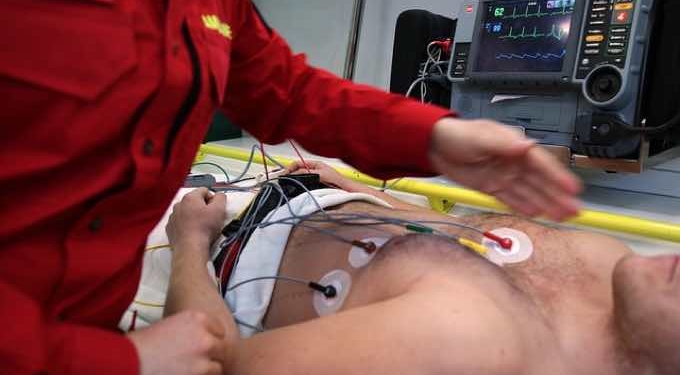
Paramedic to RN bridge programs provide an accelerated path for paramedics to become registered nurses, using the skills they have obtained in their work environment as a foundation for their education.
Over the course of 18 months to two years, you will be prepared to sit for the National Council Licensure Examination (NCLEX) in order to become a certified registered nurse (RN). In some cases, these nursing programs allow the student to obtain an Associate Degree of Nursing (ADN) while working towards their license.
A paramedic to RN bridge program is an excellent option for those who have families or desire a regular work schedule. Becoming an RN can provide a healthy balance between work and personal life.
Some of the people in the classes that you will be taking may not be part of the paramedic to RN bridge program, but they will still need to take similar courses for their degree.
Your previous professional experience will give you a head start in the classroom, since you will be able to better contextualize what you are learning.
Whether you choose an online or traditional program, your insight into the medical field will be greatly beneficial to you and your peers during class discussions and assignments.
How do I transition from a paramedic to an RN?
Professional training and scope of practice are the major differences between paramedics and registered nurses. Some paramedics choose to advance their certification by earning a Bachelor of Science in Nursing degree (BSN) since an RN license typically requires a degree.
Becoming a nurse can boost your income and employment opportunities as well as provide the chance to specialize or move into supervisory positions. More importantly, an MSN will require a bachelor’s degree for enrollment, adding one more advantage a BSN has over an ADN.
My Degree and What It’s Good For
Working as a paramedic can be a fast-paced and stressful job during emergency situations. If you are interested in continuing on in the medical field but would prefer a different work environment, a paramedic to RN bridge program is a great option.
Registered nurses are responsible for both coordinating and providing patient care, as well as educating their patients and their community about health conditions. They also provide emotional support to patients and families, as well as offer advice on maintaining good health. As an RN, you have the opportunity to work in:
- Hospitals
- Doctors’ Offices
- Home Healthcare
- Nursing Homes
- Schools
- Military
- Correctional Facilities
As a paramedic, the work place is unpredictable and stress levels range from nonexistent to extremely intense. Becoming an RN allows you to choose your work environment, giving you more control over over where and how you work.
Classes I Can Expect To Take
As with any degree program, a paramedic to RN bridge program is designed to help you to become successful and confident going into your future career.
While some of these programs may vary slightly in their curriculum, all of them will ensure that you have a thorough understanding of microbiology, human anatomy and physiology, and some psychology.
Since writing is a part of an RNs job, many degree programs require at least one English composition class in addition to your primary English core classes.
Once you have a solid grasp of the fundamentals, you will go on to take exciting classes in the following topics:
- Adult Nursing
- Child and Family Nursing Care
- Crisis Care
- Issues in Nursing
- Professional Nursing Practices & Patient Care
While this is not entirely common, some degree programs may also require you to complete an internship before graduating. Other programs may allow you to pick a specialized area of nursing once you have completed the required courses.
Registered nurses are needed in a variety of specializations including cardiac, trauma, forensic, surgical, neonatal nursing, and more. If you choose a specific area after you have obtained your RN degree, typically all you may need to do is take a couple of extra classes in that subject and pass a nationally recognized licensing exam.
My Earning Potential
As with most occupations, location and industry are key determinants of salary potential. According to The Bureau of Labor Statistics (BLS), the national average salary for an RN is $69,790 as of 2018. As an RN, you will have the potential to earn more than the overall national salary of $67,230.
No matter where you live, the industry that employs the largest percentage of RNs out of any of the other healthcare organizations are general medical and surgical hospitals. Earning your RN degree and license is a great step toward making more money and furthering your career in the medical field.
Other Nursing Bridge Programs
There are bridge programs designed for nurses at any stage of their career. Many of these programs are designed for the working professional, making it easier than ever before to continue your education.
- LPN/LVN to RN Bridge Programs – LPN/LVNs are often supervised by RNs. By completing this program, you will then become qualified to supervise LPN/LVNs and work more closely with physicians.
- RN to BSN Degrees – A bachelors in nursing will make you a valued candidate when applying for a job or asking for a promotion. A BSN bridge program is typically completed within two years, and will give you a greater understanding of medical practices and patient care.
- RN to MSN Degrees – As an RN, the workforce is decently competitive. Pursuing a master’s degree in nursing provides the opportunity to really hone in on a specialization, which will help you stand out in the job market and potentially increase your overall salary.
Paramedic to RN bridge programs are an excellent option for those in the workforce who are looking to advance their careers.









![Everything You Ever Wanted to Know About 9/11 Conspiracy Theory in Under 5 Minutes [VIDEO] | by James Corbett](https://consciouslifenews.com/wp-content/uploads/2018/09/911-a-conspiracy-theory-120x86.jpg)
